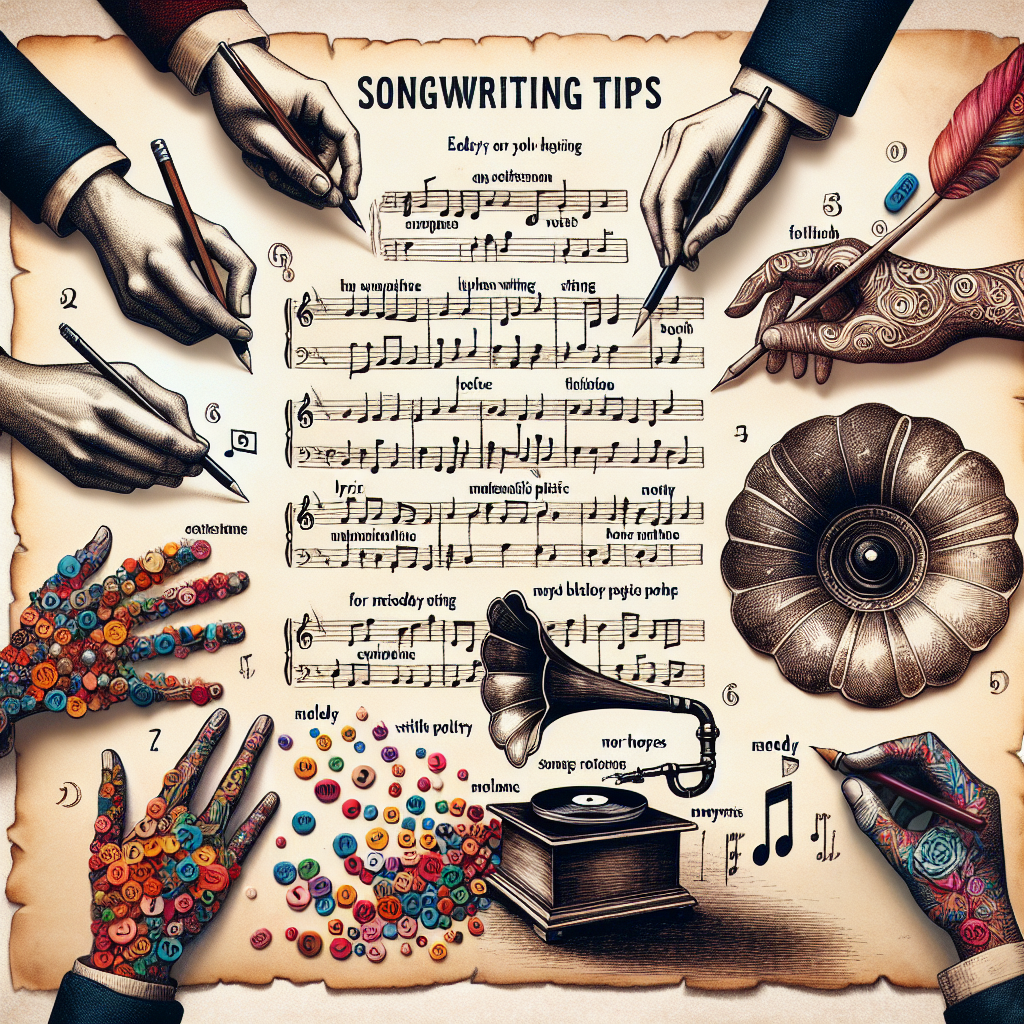
Techniques to Enhance Your Songwriting Skills
Welcome aspiring songwriters! Are you ready to dive into the wonderful world of songwriting? Crafting a song that captivates listeners requires a blend of creativity, technique, and passion. Whether you're a beginner seeking to enhance your songwriting skills or someone looking to explore the art of music composition, this post "Techniques to Enhance Your Songwriting Skills" is your guide to mastering song structure, lyrics, and melodies. Let's unleash your creativity with these 5 essential tips!
1. Embrace the Basics of Song Structure
Understanding the foundation of song structure is crucial for creating a cohesive and engaging piece of music. A typical song structure consists of verses, choruses, bridges, and possibly pre-choruses. Verses set the scene and tell the story, while the chorus is the emotional core that listeners remember. Experiment with different structures to find what works best for your song. Remember, there are no strict rules in songwriting - let your creativity flow!
2. Craft Compelling Lyrics
Lyrics are the heart and soul of a song, carrying its message and emotions. To write compelling lyrics, draw inspiration from personal experiences, observations, or even fictional stories. Play with imagery, metaphors, and wordplay to create vivid and relatable lyrics. Don't be afraid to revise and refine your lyrics until they resonate with your intended message. Your words have the power to evoke emotions and connect with your audience on a deeper level.
3. Explore Melody Creation Techniques
Creating a memorable melody is like painting with sounds. Experiment with different melodies by playing around with rhythm, pitch, and phrasing. Sing or hum variations of your lyrics to discover melodic possibilities. Consider the mood and theme of your song - a melancholic melody might suit heartfelt lyrics, while an upbeat tune could complement a joyful message. Trust your instincts and let your melody guide the emotional journey of your song.
4. Collaborate and Seek Feedback
Don't be afraid to collaborate with other musicians or songwriters. Working with others can bring fresh perspectives and ideas to your songwriting process. Share your work-in-progress with friends, family, or online communities to receive constructive feedback. Embrace both positive praise and constructive criticism as valuable insights for refining your craft. Remember, growth comes from learning and evolving with each song you create.
5. Practice, Persistence, and Patience
Songwriting is a skill that develops over time through practice and dedication. Set aside regular time for songwriting, allowing yourself to explore new ideas and concepts. Be persistent in your pursuit of musical excellence, knowing that each song you write contributes to your growth as a songwriter. Stay patient with yourself, celebrating your progress and learning from challenges along the way. With dedication and perseverance, your songwriting skills will flourish.
In conclusion, songwriting is a journey of self-expression, creativity, and storytelling. By mastering the art of song structure, crafting compelling lyrics, exploring melodies, collaborating with others, and embracing practice, you can unlock your full potential as a songwriter. Remember, there are no limits to your creativity - let your passion for music guide you on this exciting adventure. Start writing, start creating, and let your songs resonate with the world!

Whether you're a novice songwriter or a musical enthusiast, these tips will help you on your creative journey. Dive into the world of songwriting with confidence and passion, and let your music shine bright!
Relevant Video:
FAQ: Top 5 Techniques to Enhance Your Songwriting Skills
1. What are some key techniques to improve my songwriting?
Answer: Here are five proven techniques that can significantly enhance your songwriting:
Write Regularly: Practice writing every day or on a consistent schedule to keep your creativity flowing.
Experiment with Song Structures: Don’t stick to one formula. Try different song structures (verse-chorus, AABA, through-composed) to discover new ways to tell your story.
Use Strong Melodic Hooks: A catchy melody can make your song unforgettable. Focus on crafting memorable hooks in your verses and choruses.
Focus on Lyric Writing: Strong lyrics elevate a song. Try using vivid imagery, metaphors, and emotional depth to connect with your audience.
Collaborate with Other Songwriters: Collaboration can open up new creative avenues and help you learn different approaches to songwriting.
2. How can I develop a songwriting routine?
Answer: Establishing a routine can help you stay disciplined and keep your creativity flowing. Try setting aside specific times each day or week for songwriting. Some writers prefer early mornings, while others work late at night. Experiment to find when you’re most creative. It also helps to set specific goals, like finishing a song or writing a certain number of lyrics, to keep you motivated.
3. How can experimenting with song structure improve my songs?
Answer: Traditional song structures (like verse-chorus-verse) are effective, but experimenting with different structures can make your songs stand out. For example, using an AABA format (verse-verse-bridge-verse) or writing a song without a traditional chorus can create more engaging and unique compositions. It’s important to break out of predictable patterns to keep listeners interested and to develop your own creative voice.
4. Why is it important to create a catchy melody in my songs?
Answer: A memorable melody is often the most recognizable part of a song, and it’s what listeners tend to remember long after hearing it. Crafting a strong, catchy melody can elevate your song and make it stand out in a competitive music market. Experiment with different melodic intervals, rhythms, and phrasing to create something that sticks in your listeners' heads. The melody should complement the lyrics and emotional tone of the song.
5. What are some tips for writing better lyrics?
Answer: Great lyrics often evoke emotion and paint vivid pictures. Here are some tips to improve your lyric writing:
Be Specific: Avoid clichés and be specific in your descriptions. Rather than saying "I’m sad," describe the feeling in more detail: "The rain’s been falling all day, just like my tears."
Use Imagery: Use metaphors, similes, and descriptive language to create powerful visuals.
Tell a Story: Craft lyrics that tell a story, whether it’s personal or fictional. A well-told narrative will captivate the listener.
Keep it Authentic: Write from the heart and express real emotions, even if it’s through fictional characters. Authenticity is key to resonating with your audience.
6. What role does collaboration play in songwriting?
Answer: Collaboration can open up fresh perspectives and lead to better songwriting. Working with other musicians or songwriters allows you to learn new techniques, explore different musical genres, and even overcome creative blocks. Sometimes, bouncing ideas off someone else can spark the perfect lyric or melody you might not have come up with on your own. Collaborative songwriting is also a great way to hone your skills and develop versatility as a writer.
7. How do I overcome writer's block?
Answer: Writer’s block is common, but there are ways to push through it:
Change your environment: A new setting might trigger fresh ideas.
Take breaks: Step away from the project for a while and return to it later with a fresh perspective.
Free-write: Set a timer for 10-15 minutes and write anything that comes to mind, without worrying about structure or quality. This can help break the mental barrier.
Listen to music: Inspiration can come from hearing new songs, different genres, or even reinterpreting old favorites.
Collaborate: Sometimes working with another person can help reignite your creativity and give you new ideas.
8. How do I know if my song is ready to be finished?
Answer: Knowing when to stop is an important skill in songwriting. A good sign that a song is ready is when it feels cohesive—each part (verse, chorus, bridge, etc.) flows naturally, and the melody, lyrics, and arrangement work together. Trust your instincts and listen to your song with fresh ears, as if you're hearing it for the first time. If it resonates with you emotionally and feels complete, it’s likely ready for finishing touches like mixing or recording.
9. What are some good songwriting exercises for beginners?
Answer: Here are a few exercises to help you get started:
Write a Song in One Hour: Give yourself a time limit (e.g., one hour) to write a complete song. This exercise helps with overcoming perfectionism and teaches you how to work efficiently.
Use Random Prompts: Choose random words or themes (e.g., "ocean," "dreams," or "loneliness") and write a song based on them. This will push you to think creatively and break free from writer’s block.
Reimagine a Song: Take a popular song and rewrite the lyrics or melody. This is a great way to practice different song structures and lyrical styles.
Melody Challenge: Create a melody using just a few notes and then try to build lyrics around it. This will help you develop your melodic and lyrical writing simultaneously.
10. How can I develop my unique songwriting voice?
Answer: Developing your unique voice as a songwriter takes time, but here are some tips to help you get started:
Be Authentic: Write about what resonates with you personally. Songs written from the heart often connect with others.
Experiment: Try different styles, genres, and approaches to songwriting. Don’t be afraid to break conventions.
Draw Inspiration from Life: Life experiences, personal stories, and emotions are powerful sources of inspiration that can set your writing apart from others.
Trust Your Instincts: Don’t overthink your writing. Trust your gut and write what feels right to you, even if it’s unconventional.
11. How do I stay motivated to write consistently?
Answer: Staying motivated requires discipline and passion. Here are some tips:
Set Writing Goals: Set specific, achievable goals, such as writing a song a week or finishing a chorus every day.
Create a Routine: Having a set time and place to write each day can help build consistency.
Celebrate Progress: Celebrate small milestones, such as completing a verse or finishing a demo. This will keep you motivated and excited about the process.
Join a Songwriting Community: Being part of a group of songwriters can provide accountability and inspiration.
Suggested Reading:

コメント